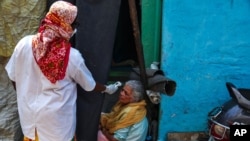As India sets new daily records in COVID-19 deaths and infections, some experts see the humanitarian crisis as an opportunity for other nations to counter China's vaccine diplomacy elsewhere.
Three of the nations that make up the Quad — U.S., Australia and Japan — are expected to assist the fourth, India, after U.S. President Joe Biden promised April 26 to provide New Delhi with the antiviral drug remdesivir, which is used in treating COVID-19, as well as with parts needed in machines that produce vaccines. India has its own vaccine production capacity and is a center of vaccine manufacturing.
India recorded more than 400,000 new confirmed cases of COVID-19 Thursday, raising the number of cases to over 21,077,410, according to the Johns Hopkins University Coronavirus Resource Center in Baltimore. The death toll in India is 230,168 people, according to the center.
Beijing has repeatedly offered to help New Delhi but has been rejected in part because of anti-China sentiment in India based on long-simmering border tensions that occasionally erupt into deadly violence.
China has denied it is engaged in vaccine diplomacy, and it says it is supplying "vaccine aid," according to The Associated Press. China considers its vaccines a "global public good," said Foreign Ministry spokesperson Hua Chunying in January.
Denny Roy is a senior fellow of the research program at the East-West Center, an independent, public, nonprofit organization in Honolulu with funding from the U.S. government, among other sources. He compared the response to the global COVID-19 outbreak to a global competition.
He said that China lost the first round because the coronavirus that caused COVID-19 was first reported in humans in the Chinese city of Wuhan. The second round went to China, he said, as it appeared to be controlling the pandemic as most democratic powers, especially the United States, struggled. He described the third round as China positioning itself as a health care provider to developing countries.
"Sharing an effective vaccine, better than China's, with the region would help the Quad camp win Round Three," Roy told VOA Mandarin in an email.
In agreement with Roy was Julian Ku, a law professor at Hofstra University who studies China's relationship with international law. However, he said, it's going to be challenging to coordinate multiple countries to provide aid to India as opposed to just one country, especially when the countries are not used to working together on this issue.
"This is not like a military exercise where militaries have already been working together in different contexts. You have to coordinate between health agencies and companies," Ku said.
The partnership allows Quad leaders to take "shared action necessary to expand safe and effective COVID-19 vaccine manufacturing in 2021" and "work together to strengthen and assist countries in the Indo-Pacific with vaccination, in close coordination with the existing relevant multilateral mechanisms including World Health Organization (WHO) and COVAX (COVID-19 Vaccines Global Access)," according to a statement the White House released March 12.
Dr. Amesh Adalja, a senior scholar at the Johns Hopkins Center for Health Security in Baltimore, thinks that the partnership will need to be modified "given that it was dependent on Indian vaccine manufacturing capacity. India will, understandably, prioritize vaccines for its domestic population."
Ideally, such partnerships should be fully coordinated with COVAX and WHO to maximize impact, Adalja said in an email to VOA Mandarin.
However, Joe Thomas Karackattu, assistant professor in the Humanities and Social Sciences Department at the Indian Institute of Technology in Madras, India, where he focuses on Sino-Indian relations and China’s foreign and economic policy, told VOA Mandarin via email that COVID-19 relief cannot become a strategic turf war.
"All countries have to work together," he said. "If the Quad delivers on the pitch for the 'Quad Vaccine Partnership' … it might cement a longer-term foundation for the Quad to coordinate on multilateral cooperation, but that necessarily does not automatically translate into an organic and systematic modus vivendi in strategic affairs."
On Wednesday, the Biden administration announced that it supports waiving intellectual property protections for COVID-19 vaccines. South Africa and India had proposed the waiver, which is opposed by the Pharmaceutical Research and Manufacturers of America, a group that includes vaccine makers such as AstraZeneca, Pfizer and Johnson & Johnson.
"This is a global health crisis, and the extraordinary circumstances of the COVID-19 pandemic call for extraordinary measures. The administration believes strongly in intellectual property protections, but in service of ending this pandemic, supports the waiver of those protections for COVID-19 vaccines," wrote U.S. Trade Representative Katherine Tai.
This is a monumental moment in the fight against #COVID19. The commitment by @POTUS Joe Biden & @USTradeRep @AmbassadorTai to support the waiver of IP protections on vaccines is a powerful example of 🇺🇸 leadership to address global health challenges. pic.twitter.com/3iBt3jfdEr
— Tedros Adhanom Ghebreyesus (@DrTedros) May 5, 2021
While a waiver could remove obstacles to ramping up the production of vaccines in developing countries, crafting the waiver may take time because it will require approval from all 164 members of the World Trade Organization.
Adrianna Zhang contributed to this report.




